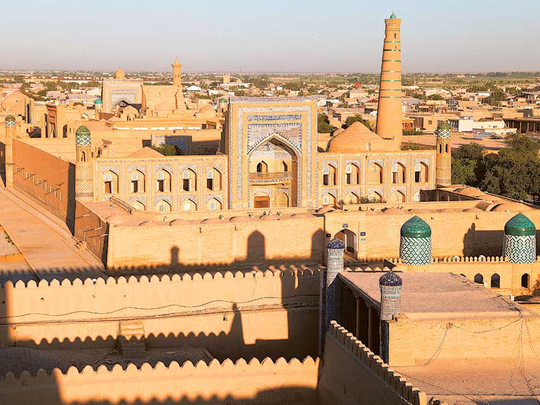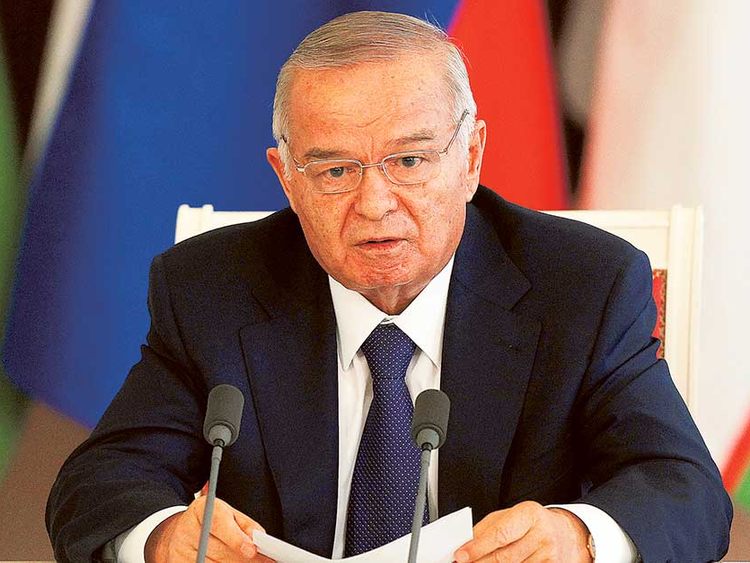
Dating back millennia, Uzbekistan brings a rich history of culture and civilisation. As one of the most ancient places still inhabited by humans, the history of Uzbekistan dates back more than 1 million years, according to archaeologists. With Stone Age settlements such as Kulbulak and Obi Rakhmon and productive land, good water sources and abundance of heat that contributed to development of farming, Uzbekistan is rich in every sense of the word.
Located at the crossroads of the Silk Road, having more than 7,000 monuments from various civilisations, many of which are on the Unesco World Heritage List, and a rich history in the world’s major religions such as Zoroastrianism, Buddhism, Judaism, Christianity and Islam, Uzbekistan provides a great destination for tourism.
The President of Uzbekistan, Islam Karimov — reported to be in a “stable” condition in hospital after suffering a cerebral haemorrhage last week — has turned the country towards an era of prosperity and growth. With reference to its policy, Uzbekistan has effectively framed its own particular model of development in relation to the national realities. The experience of Uzbekistan in the restoration of national statehood and an independent foreign policy strategy is worth careful study. Over the years, Uzbekistan has turned into a steady and prosperous nation whose model can serve as a case study for other nations.
Since its independence in 1991, the country has embraced significant changes whose results can be witnessed today. The Uzbek model of social and monetary advancement forms the bedrock of the flourishing state. It also guarantees the prosperity of the entire population of various ethnic groups.
After the Soviet Union era, Uzbekistan was left in a state of uncertainty and struggle. It is to the credit of the people of Uzbekistan and President Karimov’s government that the nation has regained its glory that lies in its heritage, its socio-political importance and its history in the Islamic world.
This year Uzbekistan led the Shanghai Cooperation Organisation. Through its foreign policy strategy, Uzbekistan attaches great importance to the SCO, enabling a platform for open and constructive dialogue.
One of the key conditions for achieving programme objectives and tasks of the SCO is further expansion and deepening of economic cooperation. SCO should provide a platform to enhance regional economic cooperation and create favourable conditions for trade and investment, modern high-tech industries and facilities.
Uzbekistan is steadily supporting further development of trade-economic ties, expanding mutual exchanges of industrial products, which are in demand in the SCO countries’ markets, creation of favourable conditions to encourage trade, as well as the implementation of other measures in this area.
As a result of Uzbekistan’s efforts, more and more countries are showing interest in the SCO and express a desire to establish a partnership with it. Thus, a memorandum on granting the Kingdom of Cambodia “Dialogue Partner” status was signed in September 2015. Such status was also granted to Azerbaijan on March 14 this year. Negotiations on admitting India and Pakistan — the two largest countries in South Asia — in the SCO are on.
During its presidency of the SCO in 2015-2016, Uzbekistan strictly adhered to the principles of continuity and strengthening of mutually beneficial cooperation, which meets the interests of the SCO member states and continued ongoing systematic work to provide the steady growth of the organisation’s credibility in the international arena.
SCO is a critical step to fortify associations in the region, in which Uzbekistan is viewed as a pioneer. A solid legal basis and institutional framework has been established, which will strengthen the association between member states, enhance Uzbekistan’s participation and presence in the region and bring stability, peace and security in the SCO space.
Uzbekistan is playing a prominent role in improving trade and bilateral relations in the region. Taleb Rifai, the Secretary General of the United Nations’ World Tourism Organisation, said at an event, “Uzbekistan is playing a leading role in strengthening international cooperation for further development of tourism on Silk Road.”
With a history of being one of the world’s premier trade routes, the Silk Road holds great value for trade and Uzbekistan — positioned right at the crossroads — holds a key position which can be leveraged to make the Silk Road the epitome of international trade routes once again.
Ever since independence, Uzbekistan has undertaken a substantial scale managerial change; modernisation and reestablishment of the structures of the states and financial administration, revamping of neighbourhood governing bodies. Furthermore, because of the fruitful changes of the indigenous socio-political framework, fast and feasible advancement of the nation has been guaranteed, establishment of another national state framework has been shaped, fair lawful state and solid common society establishments have been built.
The results of the reforms appear in a sequential increase in the number of travellers to the country. They delight not only in the natural beauty of the region, its rich history, diverse culture and beautiful historical monuments, but also in centuries-old traditions of Uzbek people, their warm hospitality, and its unique cuisine.
In Uzbekistan, there are many places of religious importance that hold value for people around the world. One of the most notable of these is Imam Bukhari’s shrine in Samarkand. Uzbekistan, which is home to several antiquated landmarks of history and society, draws in tourists from everywhere in the world.
Under recent policies and strategy as set by President Karimov, Uzbekistan has created favourable conditions for businesses involved in the provision of tourism services. According to 2015 data, there are 1,279 tourist organisations in the country.
Uzbekistan has created a huge investment potential. Since independence, businesses such as automotive, agricultural machinery manufacturing, pharmaceutical industries and information technology have ventured into another improvement stage.
Uzbekistan’s accomplishments throughout the years of independence are basically a consequence of a thoroughly considered transformation strategy proposed for a long haul expansion of its structure fuelled by peace, stability, economic growth and financial modernisation.
Khalid Athar is the Chief Editor of Teletimes International and The Asian Telegraph.












